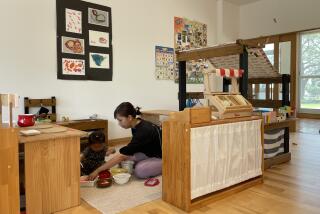One Alternative: Company Housing
- Share via
TOKYO — In a nation of notoriously high housing costs, Shinichi Watabe can show off plush quarters, in a well-to-do Tokyo suburb, that he rents for about $50 a month.
Watabe, 24, lives in a company dormitory. But it’s nothing like those of the past, when young workers were housed in unheated concrete buildings, often four or five to a room, and enthusiastic supervisors tried to instill company values of group living and personal sacrifice.
Such privation is no longer tolerated by Japanese who have grown up in comfort. Major corporations also are taking on a greater role as landlords as workers demand more help to cope with housing costs that are shooting up much faster than average pay levels.
In a recent Economic Planning Agency survey of 1,781 of Japan’s largest firms, 51.3% of the 1,211 that responded said they intend to remodel or build new dormitories for unmarried employees in the next three years.
Watabe, who has worked three years for Sumitomo Corp., a trading company, has a carpeted, furnished, 140-square-foot room with heating and cooling.
The $50 monthly rent is about one-tenth the cost of similar rooms in the neighborhood. Moreover, those rooms don’t offer some of the other features of his dormitory--a deep, hot Japanese bath ready at all times, a billiards room, an outdoor tennis court and a cafeteria with steak on the menu.
Company dorms formerly were meant to temporarily house bachelors or young families while they saved enough to buy homes. Employers structured income scales and benefit policies to permit home purchases just as workers were starting families and facing greater costs.
Now, however, Asahi Mutual Life Insurance Co. has calculated that if Tokyo-area land prices continue rising at their average annual rate of the last 15 years, 9.6%, a 20-year-old today will not be able to buy a one-room apartment before the age of 40.
This has led to a profound shift in company benefit plans.
In the Economic Planning Agency survey, the number of companies that said they intend to build new company housing rose by 17.9% from last year. But those planning to increase housing allowances decreased by 11.9%, and those planning to extend low-interest loans for mortgages fell by 8.9%.
Toshiya Yamamoto, manager of Nissan’s employee welfare section, said his company’s compensation system still is aimed at enabling a worker to buy an apartment of comfortable size within 90 minutes’ commute by age 35. But Yamamoto acknowledged that Nissan’s assistance--$233,000 in low-interest loans--is insufficient to buy a home.
Under such conditions, workers are staying in company housing even after marriage. At companies that lack housing, particularly foreign firms, Japanese are increasingly pressing their employers to acquire it.
Recruiting specialists say that among the growing number of Japanese changing jobs, the housing question is becoming more important in choosing new employers.
Watabe, employed in Sumitomo’s personnel division, said many college students looking into future employment ask about housing conditions.
Watabe said he probably won’t start thinking about whether to buy a home until he gets married. Standing on the artificial turf of his dorm’s tennis court, he pointed to his feet.
“If I wanted to buy land right now, all I could get would be the land I’m standing on,” he said.
More to Read
Inside the business of entertainment
The Wide Shot brings you news, analysis and insights on everything from streaming wars to production — and what it all means for the future.
You may occasionally receive promotional content from the Los Angeles Times.










